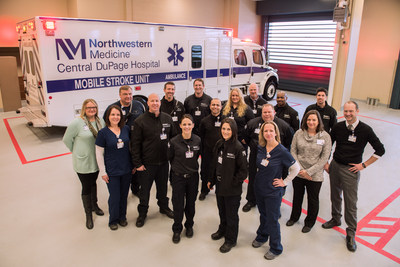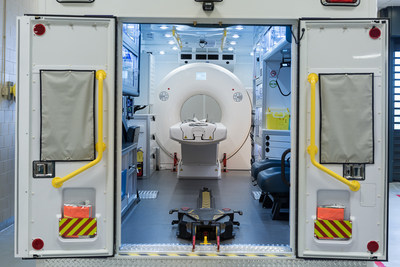|
03.05.2018 21:21:00
|
Northwestern Medicine Mobile Stroke Unit Delivers Life-Saving Care 30 Minutes Sooner
WINFIELD, Ill., May 3, 2018 /PRNewswire-USNewswire/ -- During an acute stroke blood flow to the brain stops. Every minute that passes without oxygen, another 1.9 million neurons die. With two comprehensive stroke centers, clinical research and a growing telestroke program, Northwestern Medicine is focused on providing rapid diagnosis and treatment for the more than 1,600 patients the academic medical system treats each year.
The latest tool in Northwestern Medicine's clinical offerings is a Mobile Stroke Unit, a specialized ambulance equipped with a 16-slice CT scanner to take detailed images of the brain, a direct telemedicine connection to neurologists at Northwestern Medicine Central DuPage Hospital (CDH) and stroke-specific medications, including the clot-busting drug tPA.
During its first year of service, the Northwestern Medicine Mobile Stroke Unit provided life-saving treatment 30 minutes faster than traditional transport. A data analysis found, on average, the Mobile Stroke Unit delivered tPA to ischemic stroke patients 52 minutes after 9-1-1 dispatch, compared to an average of 82 minutes for patients transported via ambulance.
Currently, tPA is the gold standard for the treatment of ischemic strokes caused by a clot. However, it can't be given until a CT scan or other imaging can determine if the stroke is ischemic or hemorrhagic. The Mobile Stroke Unit allows clinicians to make that determination from the patient's driveway.
"Every minute the brain goes without oxygen there is a 3.1 week acceleration of the natural aging process," said Harish Shownkeen, MD, medical director of the Stroke and Neurointerventional Surgery Programs at Northwestern Medicine Central DuPage Hospital. "By treating stroke patients faster, we are greatly improving the odds patients will suffer minimal to no long term deficits."
The goal is to diagnose and treat stroke within the "Golden Hour", the first 60 minutes following onset of symptoms when patients have much better outcomes. A 2014 study in JAMA found that less than 1% of patients treated with tPA in the U.S. receive the life-saving medication within the "Golden Hour". During the first year of service, 27% of eligible Mobile Stroke Unit patients received tPA within one hour of onset of symptoms.
"The Mobile Stroke Unit is a tangible example of Northwestern Medicine living its commitment to our 'patients first' mission," said Gary A. Noskin, MD, senior vice president of quality, Northwestern Memorial HealthCare. "The experience and knowledge gained from the Mobile Stroke Unit, cutting-edge clinical trials, our telestroke program and other innovative programming are helping our clinicians and researchers better understand and improve the treatment of stroke."
For patients, like Cynthia Reid from Glen Ellyn, Ill., rapid treatment in the Mobile Stroke Unit means walking out of the hospital instead of going to a post-acute care rehabilitation facility. One year after suffering what could have been a debilitating or deadly stroke, Reid's speech and memory have been fully restored. She is undergoing outpatient physical therapy to address residual numbness of her left hand. Reid says she is doing remarkably well, especially considering what could have happened.
"The Mobile Stroke Team at Central DuPage Hospital absolutely saved my life," said Reid. "They were able to give me the medication I needed right away, while also keeping me calm by reassuring me. If you think you might be having a stroke, I urge you to call 9-1-1 right away."
The first of its kind in Illinois and one of the largest in the nation, Northwestern Medicine Central DuPage Hospital's Mobile Stroke Unit can be directly dispatched by 9-1-1 to patients within the hospital's Emergency Medical Services (EMS) area, which includes Carol Stream, Glen Ellyn, Roselle, West Chicago, Wheaton and Winfield. Due to the excellent results, Northwestern Medicine is working on innovative ways to expand the service to reach more patients in the far western suburbs of Chicago.
For areas outside the region, Northwestern Medicine is developing a secondary service area in which fire protection districts and ambulance services can request the MSU for patients who meet stroke criteria. Currently, participating locations include Geneva, Batavia, St. Charles, Elburn, North Aurora and the area served by the Fox River & Countryside Fire Rescue District. Depending on the estimated arrival time, the Mobile Stroke Unit may go to the patient or arrange to meet an ambulance half-way.
"We are essentially bringing the hospital to the patient," said Mehr Mohajer-Esfahani, MSN, RN, program manager, Northwestern Medicine Central DuPage Hospital Mobile Stroke Unit. "Diagnosis and treatment begin in the Mobile Stroke Unit before the patient is transported to the closest comprehensive stroke center."
Stroke is the leading cause of disability and the fifth leading cause of death in the United States according to the American Stroke Association. Anchored by Northwestern Memorial Hospital, ranked among the top ten hospitals in the United States for neurosciences by U.S. News & World Report, Northwestern Medicine's stroke program is comprised of two Joint Commission Accredited Comprehensive Stroke Centers, two Primary Stroke Centers, a multidisciplinary physician team that includes neurology, neurosurgery, radiology and critical care, and a telestroke program that provides more than 3,000 electronic stroke consultations to eight partner hospitals throughout the Chicagoland area.
To learn more about Northwestern Medicine, visit http://news.nm.org/about-northwestern-medicine.html.



![]() View original content with multimedia:http://www.prnewswire.com/news-releases/northwestern-medicine-mobile-stroke-unit-delivers-life-saving-care-30-minutes-sooner-300642435.html
View original content with multimedia:http://www.prnewswire.com/news-releases/northwestern-medicine-mobile-stroke-unit-delivers-life-saving-care-30-minutes-sooner-300642435.html
SOURCE Northwestern Medicine
 Der finanzen.at Ratgeber für Aktien!
Der finanzen.at Ratgeber für Aktien!
Wenn Sie mehr über das Thema Aktien erfahren wollen, finden Sie in unserem Ratgeber viele interessante Artikel dazu!
Jetzt informieren!